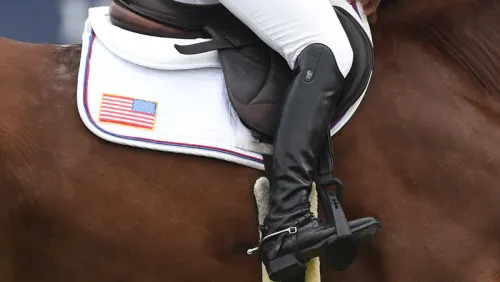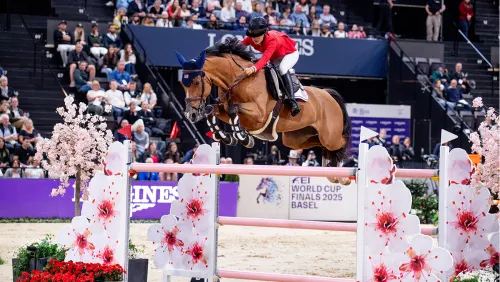Top riders regularly point out that it’s getting harder and harder to find championship horses, that is, horses that can excel over many rounds of competition at the Olympic Games, Pan American Games or FEI World Cup Final. So what is it that makes a championship horse versus “just” a grand prix winner? We asked three international competitors.
Lauren Hough
There obviously are a lot of components. They obviously have to be talented, but horses that are championship horses really know their job. You can go into all the details of the conformation, the size, the carefulness, the scope, the soundness, but really at the end of the day, they can have all those components, but if they don’t have the willingness to do it, [it won’t work]. My last good horse, Ohlala, absolutely knew it when it was important; you have this feeling that they fight for you almost extra.

Lauren Hough said her partner for 2015 Pan American Games (Canada) double bronze, Ohlala, had just the right character to excel in championships. Mollie Bailey Photo
A lot is up to the human that’s managing them. You have to really stay focused on your goals, and once they have the experience [under] their belt, you try to preserve them and aim and chose the right competitions where you know you’re going to peak when it’s time for the championship.
Fitness is a huge factor. Once they’re at that level, you don’t really need to practice too much, but you need to make sure they’re sound and fit and that they have the stamina to sustain over the five rounds if they make it to the individual final, six if you count the warm-up.
I bought Ohlala as a 7-year-old. She won a lot of classes. She won the young horse final in Aachen [Germany] and Hamburg [Germany] as an 8-year-old. Then she had a small injury beginning of her 9-year-old year. Then I did a bunch of 1.45-meter and 1.50-meter classes and won a ton, but never did I really imagine she would be a horse to jump a championship.
Then her 10-year-old year I was short a horse to go to the [Great American $1 Million Grand Prix (Fla.)] in Ocala, and she was sort of the only one I had. I thought, “I might be risking this. It’s either going to make her or break her.” It wasn’t technical, but they were huge jumps, and I ended up with one down at the very end, mostly because I think I rode nervous because I wasn’t sure if she was capable. From that day on, she grew two feet when she walked into the ring. She rose to the occasion. Then she was third in the $200,000 American Invitational CSI3* [Florida] about a week after that. From that day forward we never looked back. It happened by accident. I didn’t ever foresee her going as far as she did in the sport. But again, that goes back to her character. In 2015 we earned individual bronze at the Toronto Pan American Games. I made the jump-off, so that was seven rounds in one week.
When it comes to soundness, I go back to the character of the horse. There are maybe some horses you watch trot around in the warm-up, and you think, “How are they going to do this?” Obviously they can’t have major injuries, but if you have a bad moving horse, if they enjoy what they do, I think they’ll fight for you. You could also have the soundest horse in the world, and once they get a little scratch on their leg, they hold it up like they’ve done a suspensory. That’s why I feel quite strongly that the character is so important.
ADVERTISEMENT
A veteran of the 2000 Sydney Olympic Games, the 2010 Alltech FEI World Equestrian Games (Kentucky) and six FEI World Cup Finals, Lauren Hough also competed at three Pan American Games, winning a team gold medal and two team bronze medals, as well as individual bronze at the 2015 Toronto Pan American Games. She splits her time between Wellington, Florida, and the Cotswolds, England.
McLain Ward
A lot of horses can have one good round or one good day, but for a variety of reasons [can’t do a championship]. It can be that their scope after five rounds gets called into question. It can be physical strength, that for a round or two they can compete at that level, but if they do that for five or six rounds they’ll come up short.
The horse’s fight and heart and willingness, that’s what makes an Azur different than a horse that wins a July five-star at a nondescript show. That’s something that’s unseen. It’s a little bit what the problem with the market is: There are enough horses that win grand prix [classes], not a lot that win championships medals, and that’s a big gap actually.

When McLain Ward paired up with HH Azur, he hoped she would develop into a championship partner, and in 2017 they won the Longines FEI Show Jumping World Cup Final (Neb.). Mackenzie Clark Photo
Soundness and fitness are huge. There are many different factors, as well as age. I have a group of horses that are a little bit older. On one hand you look at an Azur, who just won one of the biggest grand prix in the world [the $1.2 million Rolex Grand Prix of Geneva] in phenomenal form. But I can’t ask her to do that five days in a row now. I wouldn’t do it. Is she capable of still winning some of the biggest grand prix [classes] in the world? Absolutely. Would I ask her to jump a world championship? Not at this time.
With Azur, in particular, the thought process early on [was that she would be a championships horse]. When we went to see her, François Mathy felt strongly that’s what she was, and she showed a tremendous amount of scope and physical ability very early on. She was quite a blood horse with a lot of energy, and that was going to have to be managed. I think that was pretty obvious that’s what that horse was capable of.
Some are not always that way. Like Contagious, he developed into a championships horse. It wasn’t something that was on our radar, but he had a lot of heart and fight and was able to step up and compete successfully at that level.
The winner of the 2017 Longines FEI Show Jumping World Cup Final (Nebraska), McLain Ward has earned two team gold and two team silver Olympic medals for the United States. He has team gold, silver and bronze medals from the FEI World Equestrian Games as well as gold individual and team medals plus a team bronze from the Pan American Games. He lives in Brewster, New York, and Wellington, Florida.
Darragh Kenny
ADVERTISEMENT
I think the most important thing is consistency and predictability. When you’re going to a championship, you want a horse that you know can jump day in and day out the same, can be very predictable in what they do and very consistent in how they do it.

With Imothep, Darragh Kenny finished 12th individually at the Alltech FEI World Equestrian Games (France) in 2014. Mollie Bailey Photo
Those are the things that are the most important. People talk about, “Oh, you need championship scope, or this or that,” and I don’t fully agree with that. If a horse is predictable and consistent, they grow as the week goes on, and they get better. The most important is consistency.
All of the ones I’ve ever ridden at a championship level, they were all horses that could jump week in and week out at five-star grand prix [classes] and be consistent and be predictable. You knew how they would react over the week of the championship.
If you have a young one, you start with the idea that they’re going to be a championship horse, hopefully, but I do think some horses turn out, and they’re super grand prix horses but not really championship horses. Other horses, [they are] maybe not even super fast grand prix horses, but they’re amazing championship horses. I think you go back and forth between the two, and hopefully you end up with one that can do both.
Darragh Kenny has represented Ireland at the 2021 Toyko Olympic Games, the 2014 FEI Alltech World Equestrian Games (France) and three FEI European Championships. He competed four times in the Longines FEI Nations Cup Final (Barcelona), earning team gold, silver and bronze. He splits his time between Wellington, Florida, and Meijel, the Netherlands.
_________________________________________________________________________________
This article appeared in the March 13 & 20, 2023, issue of The Chronicle of the Horse. You can subscribe and get online access to a digital version and then enjoy a year of The Chronicle of the Horse and our lifestyle publication, Untacked. If you’re just following COTH online, you’re missing so much great unique content. Each print issue of the Chronicle is full of in-depth competition news, fascinating features, probing looks at issues within the sports of hunter/jumper, eventing and dressage, and stunning photography.
What are you missing if you don’t subscribe?














